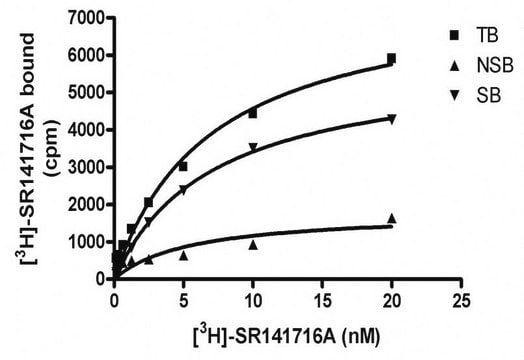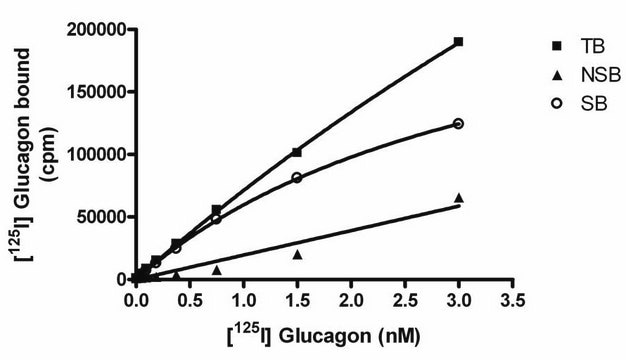HTS101M
CHEMISCREEN MEMBRANE PREPARATION RECOMBINANT HUMAN µ (Mu) OPIOID RECEPTOR
Human Mu / OP3 / MOP / MOR GPCR membrane preparation for GTPγS Binding & Radioligand Binding Assays.
Synonym(s):
ChemiSCREEN Receptor Kit, µ-Opioid Receptor Membrane Prep
Sign Into View Organizational & Contract Pricing
All Photos(1)
About This Item
UNSPSC Code:
41106514
eCl@ss:
32161000
NACRES:
NA.41
Recommended Products
biological source
human
Quality Level
recombinant
expressed in Chem-5 cells
manufacturer/tradename
ChemiScreen
Chemicon®
technique(s)
ligand binding assay: suitable (GTPγS)
radioligand binding assay (RLBA): suitable
NCBI accession no.
UniProt accession no.
shipped in
dry ice
Gene Information
human ... OPRM1(4988)
General description
Full-length human OPRM1 cDNA encoding Mu
Opiates derived from the opium poppy, Papaver somniferum, have been used in for millenia for their anti-diarrheal, analgesic and euphoric properties. More recently, endogenous peptides, enkephalins, dynorphins, and endorphins, were found to bind to the same sites as opiate alkaloids. The receptors for the classical opioids are three related GPCRs, µ κ and δ that activate Gi/o to reduce intracellular cAMP levels. Most clinically used opioids function by activation of the µ opioid receptor (Dhawan et al., 1996). Chemicon′s µ opioid receptor membrane preparations are crude membrane preparations made from our proprietary stable recombinant cell lines to ensure high-level of GPCR surface expression; thus, they are ideal HTS tools for screening of µ opioid receptor interactions with its ligands. The membrane preparations exhibit an EC50 of 1.6nM for DAMGO in a GTPγS binding assay.
Application
GTPγS Binding and Radioligand Binding Assay.
Biochem/physiol Actions
GPCR Class: A
Protein Target: Mu / OP3 / MOP / MOR
Target Sub-Family: Opioid
Quality
EC50 in GTPγS binding assay by DAMGO: ~ 1.6 nM
Specifications
Inucbation Conditions
ASSAY CONDITIONS: Membranes are permeabilized by addition of saponin to an equal concentration by mass, then mixed with [35S]-GTPγS (final concentration of 0.3 nM) in 20 mM HEPES, pH 7.4/100 mM NaCl/10 mM MgCl2/0.5 μM GDP in a nonbinding 96-well plate. Unlabeled DAMGO added to the final concentration indicated in Figure 1 (final volume 100 μL), and incubated for 30 min at 30°C. The binding reaction is transferred to an FB filter plate (Millipore MAHF B1H) previously prewetted with water, and washed 3 times (1 mL per well per wash) with cold 10 mM sodium phosphate, pH 7.4. The plate is dried and counted.
One vial contains enough membranes for at least 200 assays (units), where one unit is the amount of membrane that will yield greater than 1000 cpm specific DAMGO-stimulated [35S]-GTPγS binding.
The μ opioid receptor membrane preparation is expected to be functional in a radioligand binding assay; however, the end user will need to determine the optimal radiolabeled ligand for use with this product.
ASSAY CONDITIONS: Membranes are permeabilized by addition of saponin to an equal concentration by mass, then mixed with [35S]-GTPγS (final concentration of 0.3 nM) in 20 mM HEPES, pH 7.4/100 mM NaCl/10 mM MgCl2/0.5 μM GDP in a nonbinding 96-well plate. Unlabeled DAMGO added to the final concentration indicated in Figure 1 (final volume 100 μL), and incubated for 30 min at 30°C. The binding reaction is transferred to an FB filter plate (Millipore MAHF B1H) previously prewetted with water, and washed 3 times (1 mL per well per wash) with cold 10 mM sodium phosphate, pH 7.4. The plate is dried and counted.
One vial contains enough membranes for at least 200 assays (units), where one unit is the amount of membrane that will yield greater than 1000 cpm specific DAMGO-stimulated [35S]-GTPγS binding.
The μ opioid receptor membrane preparation is expected to be functional in a radioligand binding assay; however, the end user will need to determine the optimal radiolabeled ligand for use with this product.
Physical form
Liquid in packaging buffer: 50 mM Tris pH 7.4, 10% glycerol and 1% BSA with no preservatives.
Packaging method: Membrane protein was adjusted to the indicated concentration in packaging buffer, rapidly frozen, and stored at -80°C
Packaging method: Membrane protein was adjusted to the indicated concentration in packaging buffer, rapidly frozen, and stored at -80°C
Storage and Stability
Maintain frozen at -70°C for up to 2 years. Do not freeze and thaw.
Legal Information
CHEMICON is a registered trademark of Merck KGaA, Darmstadt, Germany
Disclaimer
Unless otherwise stated in our catalog or other company documentation accompanying the product(s), our products are intended for research use only and are not to be used for any other purpose, which includes but is not limited to, unauthorized commercial uses, in vitro diagnostic uses, ex vivo or in vivo therapeutic uses or any type of consumption or application to humans or animals.
Storage Class
12 - Non Combustible Liquids
wgk_germany
WGK 2
Certificates of Analysis (COA)
Search for Certificates of Analysis (COA) by entering the products Lot/Batch Number. Lot and Batch Numbers can be found on a product’s label following the words ‘Lot’ or ‘Batch’.
Already Own This Product?
Find documentation for the products that you have recently purchased in the Document Library.
Donna A Volpe et al.
Regulatory toxicology and pharmacology : RTP, 59(3), 385-390 (2011-01-11)
The safe disposal of unused opioid drugs is an area of regulatory concern. While toilet flushing is recommended for some drugs to prevent accidental exposure, there is a need for data that can support a more consistent disposal policy based
Thomas T Joseph et al.
ACS chemical neuroscience, 12(9), 1487-1497 (2021-04-28)
Ketamine is an anesthetic, analgesic, and antidepressant whose secondary metabolite (2R,6R)-hydroxynorketamine (HNK) has N-methyl-d-aspartate-receptor-independent antidepressant activity in a rodent model. In humans, naltrexone attenuates its antidepressant effect, consistent with opioid pathway involvement. No detailed biophysical description is available of opioid
Our team of scientists has experience in all areas of research including Life Science, Material Science, Chemical Synthesis, Chromatography, Analytical and many others.
Contact Technical Service








